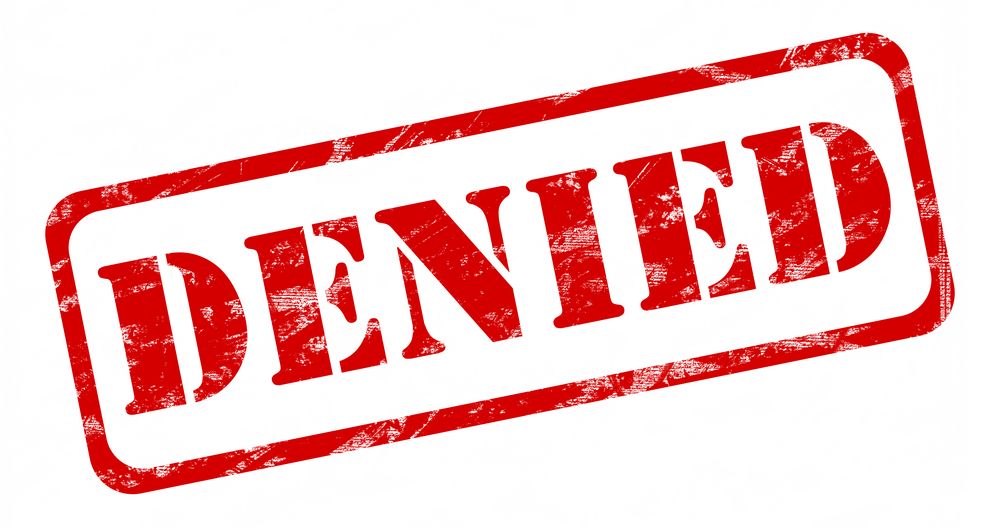The basis for any Workers’ Comp claim is to obtain money for medical bills and missed salary due to an injury received at work. Was your Workers’ Comp Claim Denied? We understand this can be a devastating blow to the injured party. Preparing before you complete and submit a claim can help you prevent having your claim denied.
Workers’ Compensation is a type of insurance that employer’s take out on their employees. When an employee is injured on the job, the insurance pays for their medical bills and time missed from work. For many people, the compensation they expect for their claim is the only means of compensation. Going to an experienced Workers’ Comp lawyer to help you file is the best preventive measure you can take. If in spite of your best efforts, your claim is denied, it may be for one of the following reasons.
- You Aren’t Eligible – If you weren’t on the job or acting on the behalf of your employer when you were injured, you aren’t eligible.
- You Didn’t Report the Injury in Time – In California, you must report your injury to your employer within 30 days. If it is an injury that occurs over time, it must be reported to the employer within 30 days of the date that you first sought medical help or that you had to take off time from work as a result.
- The Claim Wasn’t Filed on Time – Filing a Workers’ Comp claim is a multi-step process that begins with the DWC-1 claim form. You give this form to your employer who, in turn, submits it to the insurance company with which he/she has Workers’ Comp coverage. You have up to one year from the date of injury to file this form. Failure to meet this deadline will automatically result in your having your workers’ comp claim denied.
- You Received No Medical Treatment – You usually have to have documented proof of medical treatment before your claim is approved.
- Your Employer Disputes Your Claim – Your employer may dispute your injury as being work-related or claim that it occurred due to another type of disqualifying reason.
Employer’s Workers’ Comp Responsibilities
Employers are required to carry Workers’ Comp to protect their employees and they may not make their employees pay for any portion of the coverage. It is the employer who must provide the claim to the employee after they are injured.
You will receive a letter stating the reason your claim is denied. Regardless of what the reason is, you should take the letter to a Workers’ Comp attorney in San Diego right away. You will have only twenty days from the time you receive a denial or an award letter to appeal the decision if the decision was handed to you. If it was sent by mail, you will have twenty-five days. Once the file has been submitted, you will usually deal with a claims adjuster who represents your employer’s insurance company.
Declaration of Readiness to Proceed
To get a hearing before a judge, you will need to complete and file a Declaration of Readiness to Proceed. Your mandatory settlement conference (MSC) will then be scheduled. During the hearing, the judge will discuss your case with you and the claims administrator in an attempt to reach a settlement. If it fails, you will have to fill out more documents to clarify the areas of dispute. The judge will then schedule a trial before a different judge. Following the trial, the judge will send a decision by mail after 30 to 90 days. If either side disagrees with the judge’s decision, the next step is to file a Petition for Reconsideration.
The Petition for Reconsideration
If you feel that the evidence used to make a decision wasn’t supported by the evidence of your case, you can file a Petition for Reconsideration. This document will be sent to the appeals board to consider your reasons for thinking the decision should be changed. The board will have 60 days to either accept or deny it. Failure to get a response within this time period means that it has been denied.
If your Workers’ Comp claim is denied based on the information you provided with the Petition for Reconsideration, you and the insurance company can file for a “writ of review”. This petition is filed with the court of appeal in your district. The only action taken by the appellate court will be to consider whether the appeals board reached a reasonable conclusion based on the facts they were given. Although the latter rarely overturns the decision of the previous, you have forty-five days to petition.
Why You Need a local San Diego Lawyer to Handle Your Workers’ Comp Claim
The laws and process for filing a Workers’ Comp claim are complex and confusing to most people. The best time to prevent a workers’ comp claim from being denied is when the original form is filed. Completing the form accurately and presenting evidence of your injury during this stage can validate your claim.
Even if your claim is approved, you may not get sufficient benefits for the medical bills and time off from work that resulted. A Workers’ Comp attorney can advise you on the reasons that your Workers’ Comp claim is denied or why the benefits received weren’t sufficient. If necessary, he can then guide you through the appeals process.
Once you have gone through the process and been approved for Workers’ Comp benefits, you may still have problems receiving them. An experienced Workers’ Comp attorney can help you understand the issues causing your problems and help you find solutions to help in your recovery.
No one should ever go it alone whether you are just filing a new claim or a previously filed Workers’ Comp claim has been denied. We know the common practices for claims administrators and insurance companies to deny legitimate Workers’ Comp claims. Contact us for experienced legal representation to help you get your claim approved. We have a long record of successful claims and appeals behind us and you don’t pay until we win your appeal for you.






